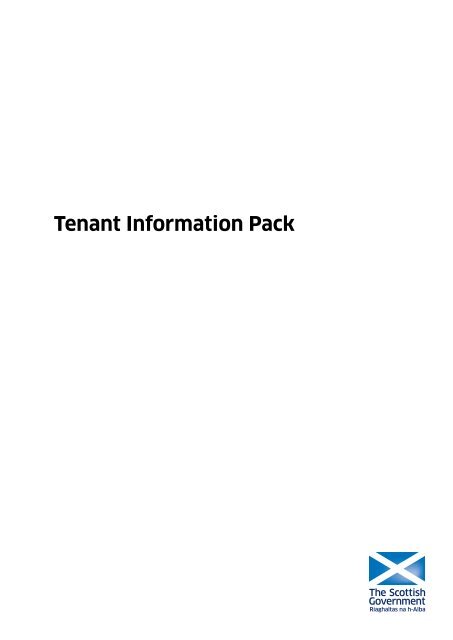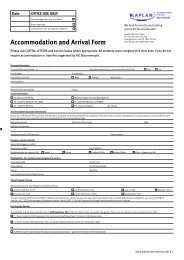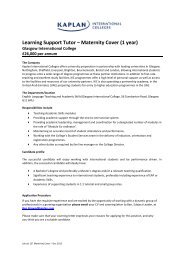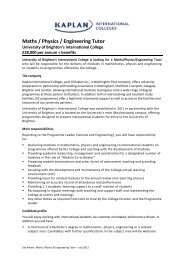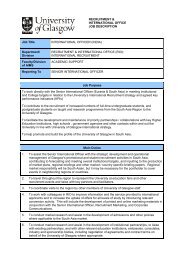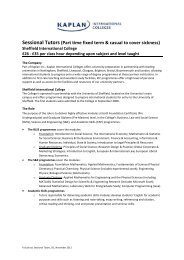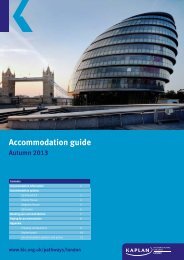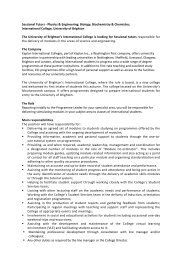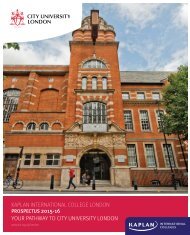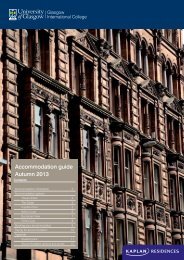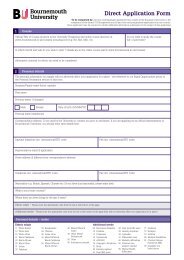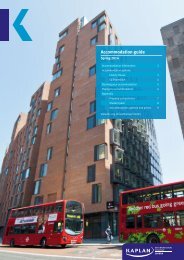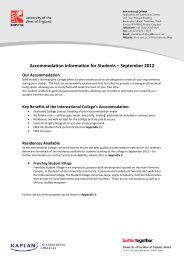Tenant Information Pack - Kaplan International Colleges
Tenant Information Pack - Kaplan International Colleges
Tenant Information Pack - Kaplan International Colleges
You also want an ePaper? Increase the reach of your titles
YUMPU automatically turns print PDFs into web optimized ePapers that Google loves.
TENANT INFORMATION PACKContents1 Your tenancy1.1 Short assured tenancy1.2 Assured tenancy1.3 Tenancy agreement1.4 Ending your tenancy1.5 Grounds for landlords regaining possession of their property2 <strong>Information</strong> about the property2.1 Gas safety2.2 Electrical safety2.3 Energy Performance Certificate2.4 Council Tax2.5 Number of people who may live at the property2.6 Repairing Standard2.7 Inventories2.8 Fire safety3 <strong>Information</strong> about your landlord3.1 Landlord registration3.2 House in multiple occupation (HMO) licensing4 Responsibilities of tenants and landlords4.1 <strong>Tenant</strong>’s main responsibilities4.2 Landlord’s main responsibilities4.3 Role of letting agents4.4 Harassment and unlawful eviction4.5 Tenancy deposit schemes4.6 Antisocial behaviour – tenant and landlord obligations5 Further advice and support3
1 Your tenancyYour rights in privately rented housing depend on the type of tenancy agreement youhave with your landlord. The following information provides a broad set of rules forthe most common tenancies – assured and short assured tenancies. If there is anydoubt, you should get legal advice to be certain of the type of agreement you havesigned or are being asked to sign.1.1 Short assured tenancyThe most common type of agreement in the private sector is a short assuredtenancy, which has been available since 2 January 1989. Your landlord must giveyou a special form (called an AT5 form) before you sign your tenancy agreement ormove in. The form states it is a short assured tenancy. The initial let must be for atleast six months otherwise it is not a short assured tenancy. After the initial let periodyour landlord has the right to reclaim possession of the property. However, shortassured tenancies could be for longer, so you may want to discuss this with yourlandlord to see whether both parties would like a longer period of let.You can see a sample AT5 form at:www.scotland.gov.uk/tenant/info/formsJoint tenanciesIf you and your flatmates or housemates have a joint tenancy agreement, you will allhave exactly the same rights and responsibilities. This means you are all equallyresponsible for paying the rent and keeping to the terms of your tenancy agreement.If you want to end the tenancy, you will need to get the other joint tenants'permission first, because this will end the tenancy for everyone. However, if the othertenants do not want to move out, they can try to negotiate a new agreement with thelandlord.1.2 Assured tenancyIf you rent your property from a private landlord or letting agent, you will probablyhave an assured tenancy if:your tenancy started after 2 January 1989, andbefore the tenancy started, you were not given an AT5 form stating that it wasto be a short assured tenancy, andthe place where you live is rented as a home, andit is your only or main home.An assured tenancy gives you greater security of tenure than a short assuredtenancy. This means that it is more difficult for your landlord to require you to leave.If you would like further advice and assistance on assured tenancies, contact yourlocal Citizens Advice Bureau or Shelter Scotland (see section 5 - further advice andsupport).4
1.3 Tenancy agreementThe tenancy agreement must be a written document. Its terms should be agreedbetween you and the landlord or letting agent before you sign it.You can see an example of a model tenancy agreement, created by the City ofEdinburgh Council, at www.scotland.gov.uk/tenant/info/forms. Your landlord may,however, provide their own style of tenancy agreement, which may still be legallybinding. Where there is any doubt you should seek legal advice.In general, your tenancy agreement will include the following:The name and address of the landlord or agent (or both).The landlord’s registration number.The length of the tenancy, with start and end dates.Rent: amount due, when it is due, how it should be paid and if it will increaseduring the tenancy.How much is the deposit and possibly which tenancy deposit scheme (seesection 4.5) will hold the deposit.Who is responsible for internal decoration and internal and external repairsand maintenance.How many tenants may occupy the property.Any condition or restrictions on the use of the property, for example aboutpets, guests or smoking.1.4 Ending your tenancyIf you have a short assured tenancy your tenancy agreement will state how longyou will be renting the property. At the end of that time, your tenancy willautomatically renew itself unless:your landlord gives you written notice that they want you to leave the property;you give your landlord written notice that you want to leave at the end of thefixed term; oryour tenancy agreement states what will happen at the end of the initial fixedterm.If you have an assured tenancy your tenancy agreement may or may not state howlong you will be renting the property. If a time period is stated, during this period itwill be a "contractual assured tenancy" and your original tenancy agreement may setout how and why your landlord can require you to leave the property. If you continueto live in the property after your original tenancy agreement ends, and if you do notsign a new tenancy agreement with the landlord, your contractual tenancy will beconverted into a "statutory assured tenancy" with no fixed end date.5
If you want to leaveIf you have a short assured tenancy it is important to consider the following:Ending the tenancy at the end of the fixed term: if you want to leave when the fixedterm ends, you should give your landlord written notice. Your tenancy agreementshould state how much notice you need to give.Ending the tenancy before the fixed term ends: your tenancy agreement should saywhether or not you can end your tenancy before the fixed term ends, and how muchnotice you need to give. If your tenancy agreement does not mention this, you mayfind your landlord can still charge you rent until the fixed term ends, even if you needto move out before this.If you have an assured tenancy your tenancy agreement should state how muchnotice you need to give if you wish to leave the property. You must provide yourlandlord with written notice if you wish to leave.When your landlord wants you to leaveIf you have a short assured tenancy your landlord can give you notice in writing atleast two months before the end of the initial fixed term or at any time afterwards thatthey want possession of the property. They can serve notices during the tenancy tocoincide with the agreed termination date. If you do not vacate the property at thistime, your landlord can start legal action against you.To gain possession at the end of a short assured tenancy, your landlord must serveyou with a written Notice to Quit and either a Section 33 Notice or an AT6 Noticedepending on why they want you to leave. These forms can be viewed atwww.scotland.gov.uk/tenant/info/forms.With an assured tenancy, however, you have greater security of tenure. Ashighlighted at the start of this section, your tenancy may have no fixed end date. Inthis situation your landlord must apply for a court order requiring you to leave on thegrounds mentioned in section 1.5 below. You cannot be required to leave if none ofthose grounds apply.Breach of tenancyIf you breach any terms of the tenancy, your landlord can seek possession using thegrounds for regaining possession (see section 1.5).If you receive a Notice to Quit or AT6 Notice, do not ignore it. If you would likefurther advice and assistance on this, contact your local Citizens Advice Bureau oryour local council’s housing office.6
1.5 Grounds for landlords regaining possession of their propertyThere are 17 grounds a private landlord can use to evict an assured or short assuredtenant. Grounds 1-8 are mandatory grounds: that is, if they are proved, a Sheriffmust grant an order for possession. Grounds 9-17 are discretionary grounds: that is,even if they are proved, a Sheriff will grant a possession order only if they believe itis reasonable to do so. In summary, the grounds are:Mandatory grounds(1) The landlord wants the property to be their own home or the property waspreviously their own home.(2) A lender has repossessed the landlord’s property due to mortgage arrearsand wants to sell it.(3) Off-season holiday let (i.e. the property is normally rented out as a holidayhome).(4) Short leases (less than 12 months) between lets to students.(5) The property is needed by a minister or full-time lay missionary.(6) The landlord intends to carry out major work on the property.(7) The tenant has died and the landlord starts the eviction process within 12months of the death.(8) The tenant has three months' rent arrears. This is a mandatory ground,however, Sheriffs may apply discretion where the rent arrears have beencaused by a delay in paying housing benefit.Discretionary grounds(9) Suitable alternative accommodation is available to the tenant.(10) The tenant was served a Notice to Quit but did not leave.(11) Persistent delay in paying rent.(12) Some rent is unpaid.(13) Breach of the tenancy agreement.(14) The tenant has allowed or caused damage to the property or thebuilding’s common parts.(15) The tenant has used the property for illegal purposes or has caused anuisance or annoyance to neighbours.(16) Damage to the landlord’s furniture.(17) The property was let to the tenant because of their job and they no longerhave this job.7
2 <strong>Information</strong> about your propertyYour landlord must make sure the property is safe. The electricity supply, plumbing,water and heating systems should all be in good condition. If you have any concernsabout the safety of any item in the property, you should speak with the landlord. It isimportant that you do not move into the property until the landlord has dealt properlywith your concerns.2.1 Gas safetyIf your property has a gas supply, your landlord must arrange for an annual LandlordGas Safety Record to be carried out by a Gas Safe registered engineer. You shouldreceive a copy of this certificate. If your landlord does not provide you with a safetycertificate you can contact the Health and Safety Executive for advice (see section 5- further advice and support).If you know that your gas installations or pipework are defective, you must tell yourlandlord or letting agent. You must never use appliances that are condemned orunsafe.2.2 Electrical safetyYour landlord, in accordance with the Repairing Standard for private rentedproperties (see section 2.6), must ensure that the electrical installation andappliances provided with the property are in a reasonable state of repair and inproper working order.The Electrical Safety Council suggest that the best way for landlords to comply withthis is by having a registered electrician carry out an inspection and test of theelectrical installation (known as an Electrical Installation Condition Report) andPortable Appliance Testing at suitable intervals. Speak with your landlord if youhave any concerns about electrical safety as they should be able to provide you withinformation on the latest safety inspection. Alternatively, advice and guidance isavailable on the Health and Safety Executive website (see section 5 - further adviceand support).2.3 Energy Performance CertificateAn Energy Performance Certificate (EPC) shows a property’s energy efficiency. Italso highlights potential improvements that could save energy. On request, landlordsmust give prospective tenants (i.e. new tenants, not tenants who are simplyrenewing a lease) an EPC. However, if you rent only a single room in a largerproperty, your landlord need not provide an EPC.When advertising a property for rent, landlords must state its energy efficiency rating.You can download a sample EPC from the Scottish Government website:www.scotland.gov.uk/tenant/info/forms8
2.4 Council TaxYour tenancy agreement will probably set out who is responsible to paying counciltax. If you are unsure your local council should be able to tell you about yourresponsibilities for council tax and give you information on the current rates. If youhave signed a tenancy agreement for a room and not the entire property, check withyour landlord if you are responsible for paying council tax.If the property is occupied entirely by full-time students, you are exempt from counciltax. You must apply to your local council’s Revenues and Benefits department foryour exemption.2.5 Number of people who may live at the propertyOnly those allowed to live at a property by the tenancy agreement should occupy it.If too many people live there, meaning it is overcrowded, the council may take stepsto prevent the overcrowding continuing.Houses or flats occupied by three or more unrelated persons are called houses inmultiple occupation (HMOs). Your local council will have told your landlord themaximum number of people allowed in an HMO.How is ‘overcrowding’ defined?The number of people who may live in a property depends on the number and sizeof the rooms, and the characteristics of the people. Living rooms and bedrooms arecounted as rooms, but not the kitchen or bathroom. There is a room standard and aspace standard.Room standardThe room standard is broken when people of opposite sexes, who are not livingtogether as a couple, have to sleep in the same room. This does not apply tochildren under 10.The number of people of the same sex who can sleep in one room is limited by thesize of the room.Space standardThe space standard limits the number of people who can occupy a property, relativeto both the number and the floor area of the rooms available as sleepingaccommodation.You can get more information on overcrowding from a Shelter Scotland advicecentre, Citizens Advice or your local council.2.6 Repairing StandardYour landlord must carry out a pre-tenancy check of your property to identify workrequired to meet the Repairing Standard (described below) and notify you of anysuch work. Your landlord also has a duty to repair and maintain your property from9
the tenancy start date and throughout the tenancy. This includes a duty to makegood any damage caused by doing this work. On becoming aware of a defect, yourlandlord must complete the work within a reasonable time.A privately rented property must meet the Repairing Standard as follows:The property must be wind and water tight and in all other respectsreasonably fit for people to live in.The structure and exterior (including drains, gutters and external pipes) mustbe in a reasonable state of repair and in proper working order.Installations for supplying water, gas and electricity and for sanitation, spaceheating and heating water must be in a reasonable state of repair and inproper working order.Any fixtures, fittings and appliances that the landlord provides under thetenancy must be in a reasonable state of repair and in proper working order.Any furnishings that the landlord provides under the tenancy must be capableof being used safely for the purpose for which they are designed.The property must have a satisfactory way of detecting fires and for givingwarning in the event of a fire or suspected fire.If, after notification of any problem, the problem persists, has not been attended tosatisfactorily or if there is disagreement about whether or not there is a problem, thenyou have the right to refer the matter to the Private Rented Housing Panel (seesection 5 - further advice and support). The Private Rented Housing Panel haspower to require your landlord to carry out work necessary to meet the RepairingStandard.Repairs and maintenance - accessYou must give your landlord reasonable access to the property to do repairs andmaintenance. If you fail to agree a suitable time, your landlord must give you at least24 hours' written notice that they intend to enter the property unless they need to doan emergency repair.2.7 InventoriesAn inventory is a list of everything in the property that you are renting (for example,furniture, carpets and curtains, kitchenware) and its condition.An inventory can help avoid a dispute over your deposit when you move out becauseit proves what state the property was in when you moved in. In particular, it can helpif a dispute is lodged with a tenancy deposit scheme (see section 4.5).It is in your landlord's interest to provide an inventory because if you break ordamage anything while you are living there, the inventory shows it was not brokenbefore you moved in. On the other hand, if anything in the property is alreadydamaged, the inventory proves you did not do it.Your landlord or letting agent should give you an inventory. If they have not done soby the time you move in, ask for one.10
In summary, here are the key things you should do:Check the inventory before you sign it – make a note of anythingdamaged, broken or worn. Make sure everything in the property is listed onthe inventory, and that it lists nothing you cannot find in the property.Make sure you and your landlord sign the inventory – once you are surethe inventory is correct, both you and your landlord or letting agent shouldsign it.Take photos, then you can prove the state of the property when you movedin.Store the inventory and your photos in a place where you can find themin case you need to rely on them to get your deposit back.2.8 Fire safetyBy law, your landlord must provide fire-detection equipment (e.g. a smoke alarm) foryour property. You can find out more about fire safety requirements for privatelyrented properties on the Scottish Government website:www.scotland.gov.uk/tenant/info/formsYour landlord also has a general duty to keep your property fit for you to live in andto ensure it does not endanger your health. This includes ensuring there are no fireor other hazards in your home, such as loose wiring or dangerous stairs.If your landlord refuses to provide a fire-detection alarm or you feel there are firerisks in your property, you can take action to make sure they put things right. Eitheryou can apply to the Private Rented Housing Panel (see section 5 - further adviceand support ) or contact your local council’s environmental health department.Landlords of HMOs (see section 3.2) must ensure there are adequate fireprecautions and escape routes.The Scottish Government has produced a leaflet on fire safety in the home which isavailable at: www.scotland.gov.uk/tenant/info/forms11
3 <strong>Information</strong> about your landlord3.1 Landlord registrationMost private landlords must register with their local council to ensure they are a ‘fitand proper person’ to let property. Details of any properties let by a landlord and anyagent acting on a landlord’s behalf must be notified to the council. For mostlandlords it is an offence to let a property without being registered, with a maximumfine of £50,000.Your landlord’s registration number should be included in your tenancy agreement(unless they have only recently applied to register). You can check online atwww.landlordregistrationscotland.gov.uk to see if your landlord is registered or youcan contact your local council. If your landlord is not registered, contact your localcouncil.You can find out more about landlord registration on the Scottish Governmentwebsite: www.scotland.gov.uk/privaterenting3.2 House in multiple occupation (HMO) licensingAn HMO (house in multiple occupation) is a property occupied by three or moretenants who are not members of the same family (or one or other of two families).HMO landlords must have a licence from the local council. This ensures that theproperty is managed properly and meets certain basic safety standards. You canfind out more about HMOs on the Scottish Government website:www.scotland.gov.uk/privaterentingTo find out whether your property has an HMO licence, ask your landlord or contactyour local council. Your council will have a list of all the licensed HMOs in their area.It is a criminal offence for your landlord to operate an HMO without a licence, andthey could be fined up to £50,000. If your local council thinks a property is being runas an unlicensed HMO, they can inspect it without giving any warning. If you thinkthe HMO you are living in may be unlicensed, you should contact your local council.12
To give you this <strong>Tenant</strong> <strong>Information</strong> <strong>Pack</strong>.4.3 Role of letting agentsIf a letting agent acts for your landlord, they may be responsible for arranging yourtenancy’s day-to-day maintenance and repairs, and taking your rent payments.However, your contract is with your landlord. This is why your landlord's name andaddress must appear on your tenancy agreement.Any legal action arising from your tenancy (for example, over the return of yourdeposit) would be raised against your landlord, not the letting agent. Also, yourlandlord is legally responsible for ensuring that all safety regulations are met.Tenancy feesIt is against the law for a landlord – or a letting agent acting on their behalf – tocharge or receive any premium or require the making of any loan as a condition ofgranting, renewing or continuing your tenancy. The landlord or their letting agentmay charge only rent and a refundable deposit of two months’ rent at the most.The meaning of ‘premium’ includes any fine or other sum and what the law calls anyother ‘pecuniary consideration’ (e.g. money that has to be paid in the present or inthe future). It includes a service or administration fee or charge. It excludes,however, charges connected to the UK Government’s Green Deal that are attachedto a privately rented property. More information on the Green Deal can be found atwww.scotland.gov.uk/tenant/info/forms.4.4 Harassment and unlawful evictionIf your landlord tries to physically remove you from the property without a court’spermission, they are committing a criminal offence regardless of the circumstances.Your landlord must follow the formal legal process set out in section 1 of this pack torecover possession of their property. If you do not leave voluntarily, the landlordmust obtain a Decree for Eviction from the Sheriff Court. If the landlord obtains sucha decree, the actual eviction must be done by Sheriff Officers, not the landlord ortheir agents.If your landlord has physically removed you from your rented home or threatened todo so, you should report the matter to the Police.As a tenant of a privately rented property, the law protects you against harassmentand unlawful eviction in two ways:by making harassment and unlawful eviction criminal offences, andby enabling you to claim damages through the courts.The law against harassment applies to everyone living in residential property. Thismeans the law protects you whether you have a full tenancy or some other right ofoccupation or occupancy agreement. It applies if your landlord personally harassesor evicts you unlawfully, or if somebody else does it for them. Related to this, your14
How long will it take to get my deposit back?If you agree with the landlord’s application, the deposit will be repaid in five workingdays. The return of deposits may take longer if the amount is disputed or if one of theparties cannot be contacted or does not cooperate.You can read more about tenancy deposit schemes on the Scottish Governmentwebsite: www.scotland.gov.uk/privaterenting4.6 Antisocial behaviour – tenant and landlord obligations<strong>Tenant</strong>sEveryone has the right to live safely and peacefully without worrying about beingannoyed or harassed. Antisocial behaviour means behaviour that causes or is likelyto cause fear, alarm or distress. If you act in a way that causes nuisance orannoyance and stops people enjoying the peaceful occupation of their home, thismay be considered antisocial behaviour. These actions include, but are not limitedto:persistent, excessive noise;verbal or physical abuse of neighbours;racial or sexual harassment;vandalism in the neighbourhood or damaging neighbours’ property; ordrug abuse or selling drugs.You are also responsible for the behaviour of family or friends visiting your property.Your landlord may take action against you if you have broken a clause in the tenancyagreement which refers to antisocial behaviour.If you are affected by other people’s antisocial behaviour, you should keep a writtenrecord of the incidents, with dates and times. Depending on the seriousness of thesituation and how badly it affects you, you should contact the Police or your nearestCitizens Advice Bureau. Your local council’s Antisocial Behaviour Team should alsobe able to give you more information on these issues.LandlordsLandlords also have a responsibility to prevent their tenants behaving in an antisocialway in and around their homes. This means that if tenants are acting in a way thatcauses or is likely to cause alarm, distress, nuisance or annoyance to anyone livingnear their home, the landlord must take action. Steps landlords can take include:investigating complaints about their tenants' behaviour;writing to tenants to explain that their behaviour is causing concern andasking them to modify it;giving advice on noise reduction;asking the council to apply for an Antisocial Behaviour Order for the tenants;going to court to get an interdict to prevent the tenants behaving in a certainway; and16
threatening to evict the tenants.If a landlord's attempts fail, they can ask the council for help to address the antisocialbehaviour.However, if a landlord does not try to stop the antisocial behaviour, the local councilcan serve an Antisocial Behaviour Notice on the landlord ordering them to takespecific action to deal with the problem. If the landlord does not do what theAntisocial Behaviour Notice says, the council can ask a court to stop rent paymentsto the landlord and give the council control of the property.17
5 Further advice and supportGeneral adviceCitizens Advice ScotlandGives you details of your local CitizensAdvice Bureau which can help withmoney, legal, consumer and otherproblems.Tel: 0808 800 9060www.cas.org.ukEnergy Saving TrustGives independent help and advice onhow to save energy in the home.Tel: 0800 512 012www.energysavingtrust.org.uk/scotlandOffice of the Gas and ElectricityMarkets (Ofgem)Protects the interests of gas andelectricity consumers.Tel: 0141 331 2678www.ofgem.gov.ukHousing adviceShelter ScotlandOffers advice, information andadvocacy to tenants in privately rentedhousing.Tel: 0808 800 4444www.shelterscotland.orgPrivate Rented Housing PanelProvides tenants with a way ofenforcing the Repairing Standard and,for some tenancies, setting reasonablerents.Tel: 0141 242 0142www.prhpscotland.gov.ukSafety adviceGas Safe RegisterOffers gas safety advice and can takeaction to ensure that gas appliances inyour property are safe.Tel: 0800 408 5500www.gassaferegister.co.ukHealth and Safety ExecutiveProvides a range of health and safetyadvice.www.hse.gov.uk/contactElectrical Safety CouncilUK charity that provides electricitysafety advice for the home.Tel: 0131 445 4690www.esc.org.ukLandlord and letting agentrepresentativesScottish Association of LandlordsRepresents the interests of landlordsand letting agencies in Scotland.Tel: 0131 564 0100www.scottishlandlords.comScottish Land and EstatesRepresents the interests of rurallandlords in Scotland.Tel: 0131 653 5400www.scottishlandandestates.co.ukLandlord Accreditation ScotlandProvides you with information onaccommodation which is managed byan accredited landlord.Tel: 0131 553 2211www.landlordaccreditationscotland.comNational Landlords AssociationAn association for private landlords inthe UK.Tel: 020 7840 8900www.landlords.org.ukAssociation of Residential LettingAgentsAn association for registered lettingagents.Tel: 0844 387 0555www.arla.co.uk18
© Crown copyright 2013You may re-use this information (excluding logos and images) free of charge in anyformat or medium, under the terms of the Open Government Licence. To view thislicence, visit http://www.nationalarchives.gov.uk/doc/open-government-licence/or e-mail: psi@nationalarchives.gsi.gov.uk.Where we have identified any third party copyright information you will need toobtain permission from the copyright holders concerned.ISBN: 978-1-78256-344-0 (web only)The Scottish GovernmentSt Andrew’s HouseEdinburghEH1 3DGProduced for the Scottish Government by APS Group ScotlandDPPAS13815 (01/13)Published by the Scottish Government, January 2013w w w . s c o t l a n d . g o v . u k


